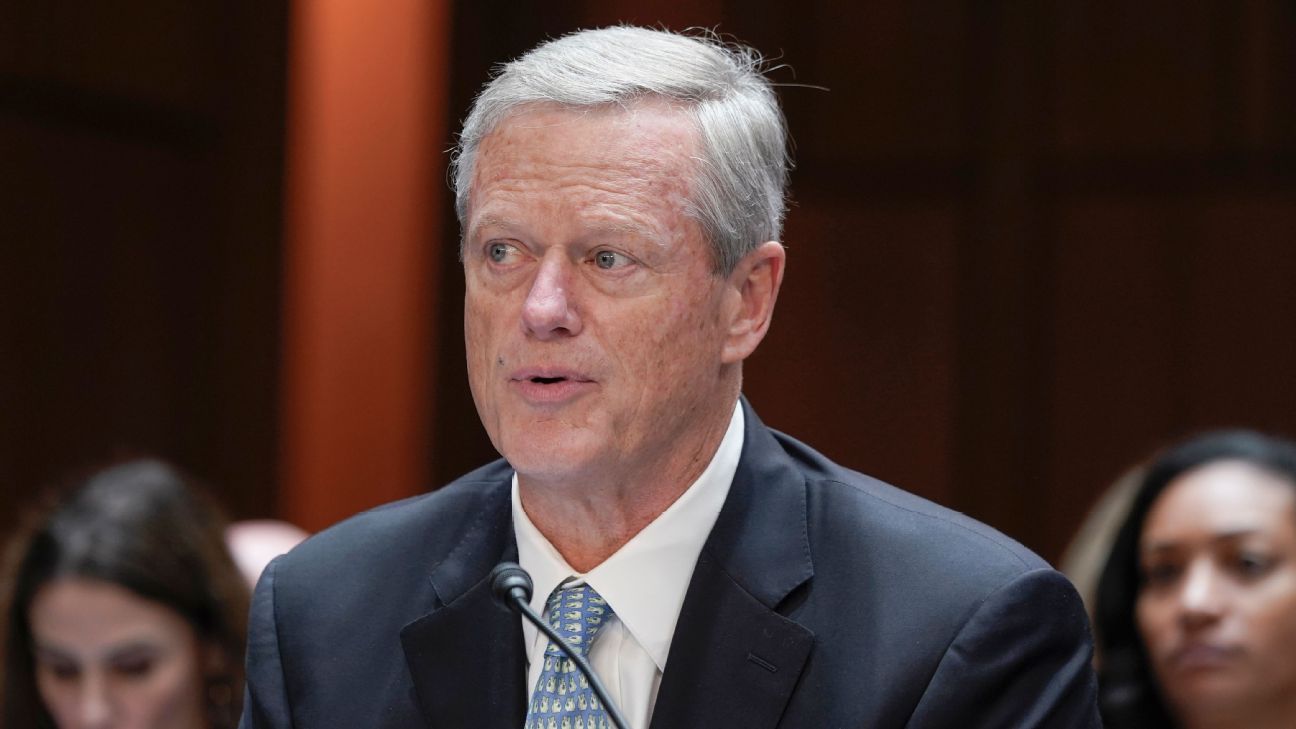[ad_1]
NCAA president Charlie Baker is calling for a ban on college prop bets in states with legal sports wagering.
Prop bets — short for proposition bets — are wagers not related to the final score of a contest. An example of such a side bet would be an over/under on how many 3-pointers an individual player will make in a game.
“Sports betting issues are on the rise across the country with prop bets continuing to threaten the integrity and competition and leading to student athletes and professional athletes getting harassed. The NCAA has been working with states to deal with these threats and many are responding by banning college prop bets,” Baker said in a statement.
His request comes on the heels of ESPN reporting that the NBA is looking into betting irregularities involving Raptors forward Jontay Porter. At issue were two games in which prop bets on Porter were the two biggest winners on prop bets in the NBA on those respective evenings.
On both occasions, Porter left the game early, ensuring the under hit on the prop bets. ESPN has not reported a link between Porter and the wagers, but the activity was flagged by league data scientists.
Baker does not want prop bets to become an issue at the collegiate level.
“This week we will be contacting officials across the country in states that still allow these bets and ask them to join Ohio, Vermont, Maryland and many others and remove college prop bets from all betting markets,” he said. “The NCAA is drawing the line on sports betting to protect student-athletes and to protect the integrity of the game — issues across the country these last several days show there is more work to be done.”
The NCAA is in the middle of the March Madness basketball tournaments, and for the sixth straight year, the number of states with legal gambling has increased, with North Carolina recently becoming the 38th.
The American Gaming Association estimates $2.7 billion will be bet this year on the men’s and women’s NCAA basketball tournaments through legal sportsbooks.
Companies that monitor sports betting for irregularities have warned college sports administrators that prop betting on unpaid athletes elevates the potential risk for a scandal.
The NCAA conducted a survey after last year’s basketball tournaments that found 58% of 18- to 22-year-olds are gambling.
Baker has said the proliferation of legal sports gambling has increased stress on college athletes.
“All that chatter about who’s playing, who’s not playing. Who’s sore, who’s not sore. What’s going on with the team you’re playing? What do you think your chances are? Which is just classic chatter, where — in a world where people are betting — takes on a whole new consequence,” Baker said in January before his address to membership at the NCAA convention.
San Diego State athletic director JD Wicker echoed those sentiments Wednesday.
“Our student athletes are going to class, they’re more available in the community,” Wicker said. “So there’s a lot more opportunity for one of them to be pressured, for them to have something negative happen because maybe they miss the free throw or they miss the over the under, all those types of things.”
The NCAA has partnered with a data science company called Signify, which also works with the National Basketball Players Association and the WNBA, to online identify threats made to athletes during championship events that are often linked to wagering.
“Basically tracks ugly, nasty stuff that’s being directed at people who are participating in their tournaments, and we’d use it the same way,” Baker said in January. “And it can shut it down or basically block it. And in some cases even track back to where it came from.”
Illinois coach Brad Underwood wants to maintain competitive integrity.
“I think in the Big Ten we’ve been very, very proactive in terms of putting out an injury report before games to help protect student-athletes and coaches. I’m a big fan of that,” he said from the East Regional in Boston Wednesday. “I would hate to see the day where nobody jumps for the jump ball because of a prop bet. To me the greatness of college athletics is the competitive integrity that we have, and we should be able to keep that.”
Information from The Associated Press was used in this report.
[ad_2]
Source link



